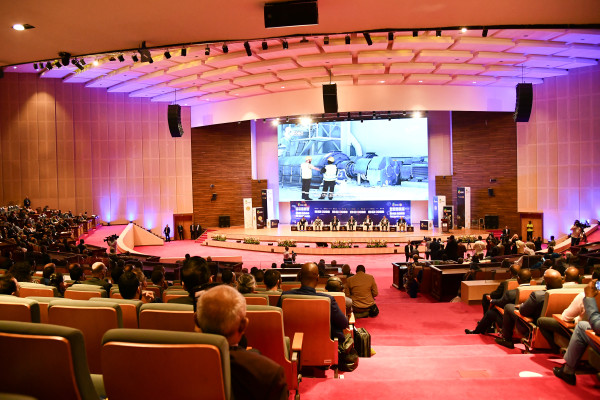An insightful panel discussion during the second day of the MSGBC Oil, Gas&Power 2023 conference and exhibition, sponsored by national industrial and mining company, the Société national industrielle et miniére, featured the participation of regional and international energy leaders and explored the role of natural gas in the global energy landscape. The panelists examined changing market dynamics as a result of the global energy transition, sustainability initiatives, and technological innovations in the sector.
Presenting an attractive option for stabilizing the path towards renewable energy development while reducing carbon emissions in the short term, the role of natural gas in Africa has the potential to drive electrification, socioeconomic development, and resource monetization on the continent. As such, the panelists noted that the share of natural gas in the global energy mix is poised to increase to 26% by 2050.
“The role of gas is huge and has a very bright future,” stated Rafik Amara, Senior Gas Analyst for the Gas Exporting Countries Forum, adding, “We are seeing that natural gas will overcome coal in the energy mix in the next three-to-four years and will be the most-used fuel from 2040 onwards. Natural gas is the only approach to achieving energy market stability.”
Estimated to contain more than 100 trillion cubic feet (tcf) of natural gas, the MSGBC region is well-positioned to leverage its immense endowment of natural resources to attract foreign investors while promoting regional collaboration and integration. What’s more, the panelists noted the importance of regional gas-to-power development and LNG export as a model to ensure and develop consistent economic development.
“We have energy, but the question is how to develop it. To develop this 100 tcf, we will need innovative development schemes and we have to have aligned objectives with partners, including with National Oil Companies,” stated Ismail Mohamed Sid Ahmed, Vice President and Mauritania Country Manager for upstream oil company, Kosmos Energy, adding, “This duality between gas-to-power and LNG export is a model we see that will develop a cash flow and part if it has to be reinvested into coming projects.”
It is estimated that natural gas will be responsible for approximately 30% of Africa’s total energy demand increase by 2050. As such, the panelists highlighted the significant discoveries in the MSGBC region – including the 13-tcf BirAllah Conventional Gas Development, the 15-tcf Grand Tortue Ahemyim gas field, and the 20-tcf Yakaar Teranga Conventional Gas Development – as imperative towards driving electrification, industrial development, and the energy transition in West Africa.
“We see innovation as a catalyst,” stated Pierre-Edouard Crouzier, Project Manager at engineering and technology company, Technip Energies, adding, “This is what enables us to deliver projects with requirements that have been spelled out during our discussions here today.”
It was noted that significant upstream investment and long-term contracts will be required to realize the potential of natural gas in the region. Speaking for the Islamic Republic of Mauritania’s Ministry of Petroleum, Mines and Energy, Khroumbaly Lehbib, Advisor for Hydrocarbons for the ministry highlighted the government’s role in developing a favorable investment environment for International Oil Companies to participate in the MSGBC region’s energy space.
“The government’s role is to create a stable legal and regulatory regime to partner with capable national and international companies who can deliver on their commitment,” Lehbib stated, adding, “We have good quality partners in the energy and oil and gas sectors, and we hope that in the next ten years, MSGBC can become one of the biggest global players in the oil and natural gas markets.”
With targets to ensure universal access to electricity and the need to develop less-carbon intensive energy resources, the panel showcased the enhancement and expansion of infrastructure as a requisite to stimulate domestic gas demand in West Africa. Furthermore, it was noted that reliable gas has the potential to provide quick access to energy for the 600 million Africans currently living without adequate access to electricity.
“The more we advance in the efficiency of gas turbines, the more we lean towards gas-focused solutions,” stated Ousmane Ndoye, Managing Director for Senegal at global energy company, GE Vernova, adding, “Gas is a key differentiator for the region today. It allows for rapid growth, thanks to quick access to electricity and it is also a reliable and sustainable transitional energy.”
Distributed by APO Group on behalf of Energy Capital&Power.
Latest Stories
-
Government could seek more IMF funding, incoming finance minister Ato Forson says
31 minutes -
Man told he can’t recover £598m of Bitcoin from tip
47 minutes -
Gun-wearing leader sparks concern at Mahama’s inauguration
58 minutes -
Boeing and Google give $1m each to Trump’s inauguration
1 hour -
TikTok to make final plea at Supreme Court against US ban
1 hour -
Supreme Court rejects Trump bid to halt hush-money case sentencing
1 hour -
Man with crocodile skull in luggage arrested at Delhi airport
2 hours -
Mozambique tense as opposition leader returns from exile
2 hours -
Morocco receives 17.4 million tourists in 2024, up 20% on 2023
2 hours -
Nigeria, China deepen ties with pledge on security, finance and economic growth
2 hours -
Shell writes down Namibia oil discovery in blow to country
5 hours -
Bellingham helps Real Madrid reach Spanish Super Cup final
5 hours -
Murray could not turn down ‘unique’ Djokovic opportunity
5 hours -
‘Trump 2.0’ looms large over the global economy
5 hours -
Ivory Coast president signals he would like to run for fourth term
6 hours

